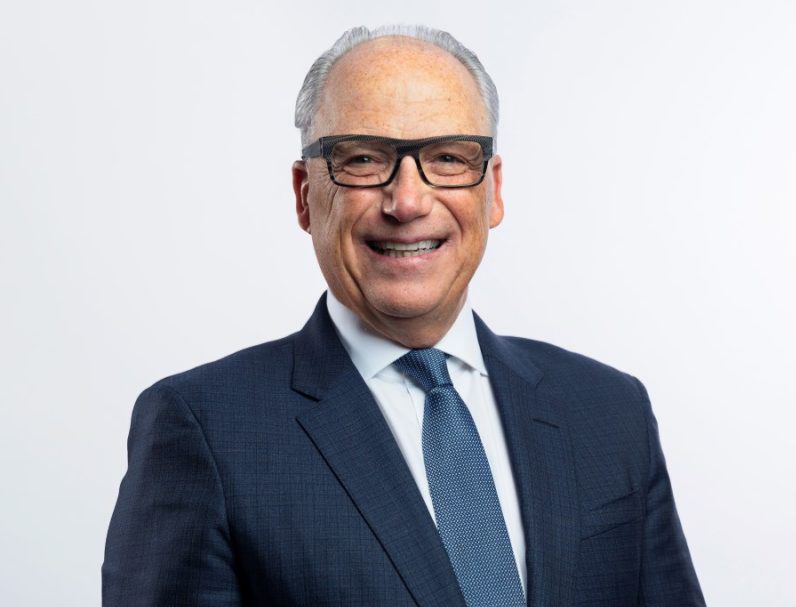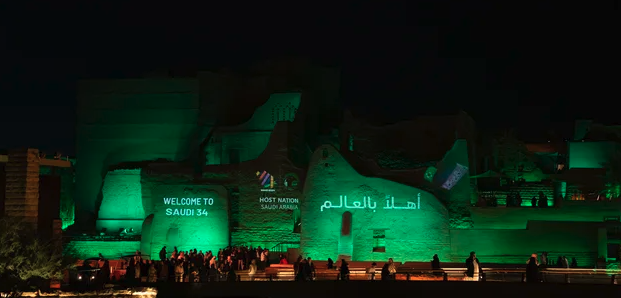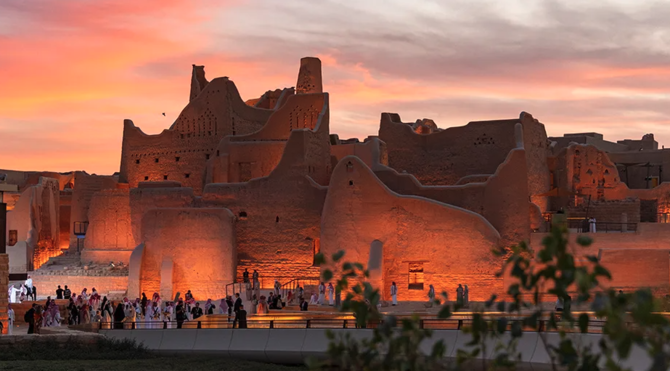RIYADH: Saudi Arabia’s tourism sector is poised for a significant leap forward with the planned opening of new luxury hotels in Diriyah – a $62.2 billion mega-development that fuses the Kingdom’s rich cultural heritage with ambitious modernity.
In October, the group CEO of Diriyah Co. unveiled plans for the groundbreaking of seven new hotels by the end of the year, to go alongside the first luxury offering, Bab Samhan, opening its doors in December.
As part of the Vision 2030 initiative, these developments are set to bolster Saudi Arabia’s position as a global tourist destination while driving economic growth and creating jobs.
Diriyah is set to play a key role in this ambition, with 33 million tourists expected in Riyadh as part of Vision 2030, including major events such as Expo, as well as sports, cultural, and business gatherings.
“The opening of additional uniquely themed hotels in Diriyah supports the Kingdom’s new ambition to welcome 150 million visitors by 2030, following the achievement of the previous target of 100 million visitors by 2023, which was reached seven years ahead of schedule,” Diriyah Co.’s Group CEO Jerry Inzerillo told Arab News.

Diriyah Co.’s Group CEO Jerry Inzerillo. Supplied
“The expansion of new hotel openings in Diriyah is anticipated to contribute to an increase in tourism spending, thereby supporting the non-oil economy and achieving financial sustainability goals,” he added.
The developments will also feature luxurious designs rooted in local heritage, with Inzerillo highlighting the Bab Samhan Hotel as a “prime example” of this philosophy.
“It offers an experience rich in authentic Najdi heritage, blending traditional design with high-quality services and a superior level of luxury,” the group CEO said.
Other hotels under construction include Orient Express, Raffles, and Baccarat, alongside Armani, Fauchon L’Hotel, Corinthia and Rosewood.
These developments are expected to draw millions of visitors annually while elevating the Kingdom’s reputation on the global stage.

The newly-opened Bab Samhan hotel. Diriyah.sa
Cultural and economic growth
Camilla Bevilacqua, partner at management consulting firm Arthur D. Little, highlighted the broader implications of Diriyah’s hotel expansion.
“Diriyah is recognized as a UNESCO World Heritage site and is the historical home of the Saudi royal family. The development of hotels in this area can attract culturally minded tourists interested in exploring the rich heritage and history of Saudi Arabia,” she said.
Bevilacqua noted the importance of integrating cultural authenticity with high-end tourism. “By offering accommodation options within or near this historical site, Diriyah can become a focal point for cultural tourism. The selection of flagship hotel brands, such as Armani and Baccarat, will be a driver for international visitation and establish Riyadh as a competitive global destination,” she added.
The expansion also addresses critical infrastructure needs, with Bevilacqua noting that the groundbreaking of these hotels will significantly increase accommodation capacity in Diriyah.
Enhancing local economies
Diriyah’s hotel developments are set to generate significant economic benefits, with experts predicting that the establishment of new hotels will create numerous direct employment opportunities across various roles.
“International flagship hotel brands will raise the quality of services and customer experience across Riyadh, setting a new standard for the sector and upskilling talent in the Kingdom,” said Bevilacqua.
Inzerillo echoed this sentiment, citing the broader employment impact. “The Diriyah project, upon its completion, aims to create over 178,000 job opportunities, positively impacting youth employment and generating new prospects for citizens and the local community,” he said.
Indirect job opportunities are also expected to thrive, particularly in sectors such as transportation, retail, entertainment, and local artisanship.
“‘Made in Saudi’ retail, F&B, and experiences can be created around the new hotels to offer a unique cultural experience for international travelers,” Bevilacqua said.
The influx of tourists and increased spending are expected to further support the local economy, with hotels playing a key role in this growth. Inzerillo said that Diriyah is projected to attract 50 million visits annually by 2030, driving this economic boost. “This influx is anticipated to increase tourism spending and enhance local revenues,” he added.
The rise of Diriyah as a tourism hub presents significant opportunities for local firms and entrepreneurs. Bevilacqua notes that hotels can partner with businesses such as restaurants, tour operators, and craft shops to create package deals or promotions that encourage tourists to extend their stay in Riyadh and boost spending.
She also emphasized the potential for the creative industry. “This will allow revitalization of the local artisan and SME scene and increase their contribution to the economy and society, weaving heritage and conservation into modernization,” said the Arthur D. Little partner.
Inzerillo pointed to the Diriyah Accelerator Program for entrepreneurship as a platform for nurturing local talent. “The program enhances capabilities through various events and initiatives, enabling entrepreneurs to benefit from tourism growth in the Kingdom and Diriyah in particular,” he said, adding: “This includes opportunities in areas such as tour guiding, transportation, hospitality, and the development of heritage-based products.”

Diriyah celebrates Saudi Arabia being awarded the 2034 FIFA World Cup. Diriyah.sa
Stimulating foreign investment
The new hotels are expected to catalyze foreign direct investment by attracting international hospitality brands and investors, which will drive increased FDI in the region and bolster the overall economy.
Diriyah’s ambitious plans include over 40 luxury hotels in partnership with global brands such as Four Seasons and Ritz-Carlton. “This initiative bolsters investor confidence in the Saudi tourism sector and enhances the influx of foreign investments into the Kingdom,” Inzerillo added.
The project also aims to build local capabilities. “Leveraging partnerships and international cooperation, local talent is poised to grow, and knowledge transfer will create sustainable tourism and heritage capabilities in the Kingdom,” Bevilacqua said.
Diriyah’s hotel expansion is not just about luxury — it is a cornerstone of Saudi Arabia’s broader tourism strategy under Vision 2030. By blending heritage and modernity, creating jobs, and attracting global investment, the project exemplifies the Kingdom’s efforts to diversify its economy and position itself as a premier global destination.
“As Diriyah becomes a tourism hotspot, it may stimulate growth in other regions and sectors, promoting a comprehensive tourism industry across the Kingdom,” Bevilacqua said.






















